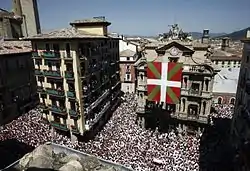Udaletxe Plaza
Plaza Consistorial | |
|---|---|
Square | |
 The square during 2013 San Fermin | |
| Coordinates: 42°49′06″N 1°38′38″W / 42.818323°N 1.644018°W | |
| Country | |
| Region | |
| City | |
| District | Alde Zaharra |

Udaletxe Plaza or Plaza Consistorial (City Hall Square) is a town square beside Pamplona-Iruña City Hall in the center of the Pamplona-Iruña Old Town in Pamplona-Iruña, Navarre.
It is worldwide known by San Fermin. The square is host to the start of the festival, on 6 July, with the txupinazo and to the end of the festival, on 14 July, with the Gaixoa Ni or Pobre de Mí.[1]
The running of the bulls and the Way of Saint James go through this square.[2]
History
The square has its origins during the Middle Ages. King Charles III of Navarre, with the purpose of ending the constant fights between the three burguak or burgos (Nabarreria, San Zernin and San Nikolas) promoted Batasun Pribilegioa or Privilegio de la Unión in 1423. By this treaty, the three urban jurisdictions became a single municipality, under the same coat of arms and taxes. This order, at the same time, ordered the destruction of the physical boundaries (mainly walls) between the three of them, conserving the outside protections.[3]
Those conflicts are now forgotten. On the field between the three burguak was built Pamplona-Iruña City Hall, which lasts till today. With the building, the square was also built.[4]
Location
It is located in the confluence between Santo Domingo, Mercaderes, San Zernin, Berria/Nueva, Zapateria and Calceteros streets, at 450 m (1,480 ft).
See also
References
- ↑ Pakus (24 June 2018). "City Hall square, architectonic treasure of Pamplona-Iruña". Diario del Viajero (in Spanish). Archived from the original on 13 July 2018. Retrieved 8 December 2020.
- ↑ "City Hall and Udaletxe Plaza". Iruñeko Udala/Ayuntamiento de Pamplona. Archived from the original on 20 September 2020. Retrieved 8 December 2020.
- ↑ "Gran Enciclopedia de Navarra | PRIVILEGIO DE LA UNIÓN". Retrieved 8 December 2020.
- ↑ "Pamplona-Iruña City Hall". Kingdom of Navarre. Archived from the original on 15 May 2008. Retrieved 8 December 2020.